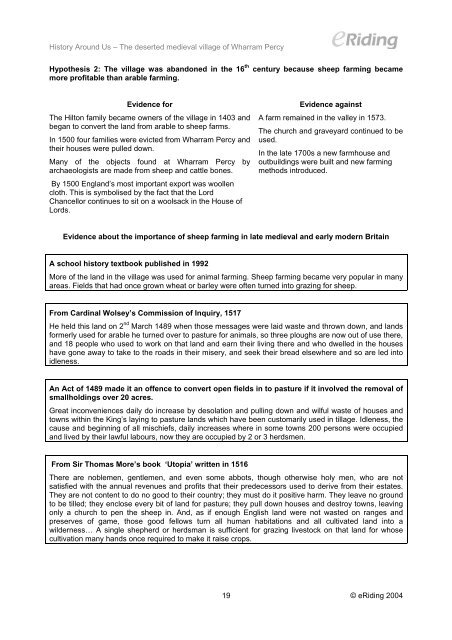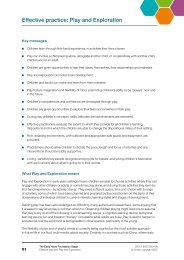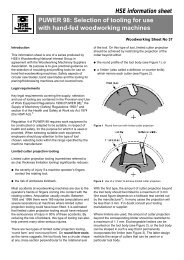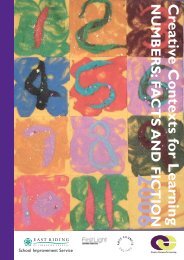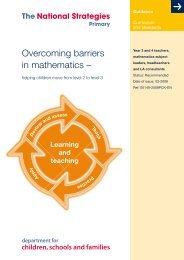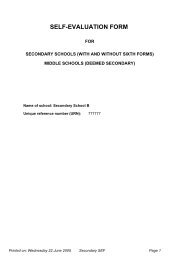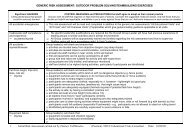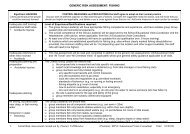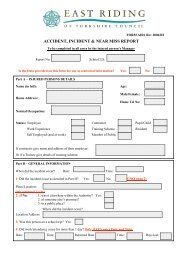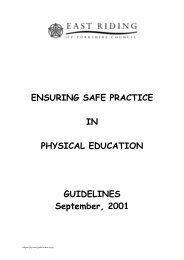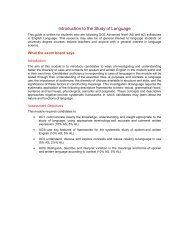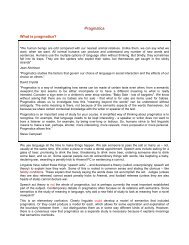GCSE Coursework: History Around Us - eRiding
GCSE Coursework: History Around Us - eRiding
GCSE Coursework: History Around Us - eRiding
You also want an ePaper? Increase the reach of your titles
YUMPU automatically turns print PDFs into web optimized ePapers that Google loves.
<strong>History</strong> <strong>Around</strong> <strong>Us</strong> – The deserted medieval village of Wharram PercyHypothesis 2: The village was abandoned in the 16 th century because sheep farming becamemore profitable than arable farming.Evidence forThe Hilton family became owners of the village in 1403 andbegan to convert the land from arable to sheep farms.In 1500 four families were evicted from Wharram Percy andtheir houses were pulled down.Many of the objects found at Wharram Percy byarchaeologists are made from sheep and cattle bones.By 1500 England’s most important export was woollencloth. This is symbolised by the fact that the LordChancellor continues to sit on a woolsack in the House ofLords.Evidence againstA farm remained in the valley in 1573.The church and graveyard continued to beused.In the late 1700s a new farmhouse andoutbuildings were built and new farmingmethods introduced.Evidence about the importance of sheep farming in late medieval and early modern BritainA school history textbook published in 1992More of the land in the village was used for animal farming. Sheep farming became very popular in manyareas. Fields that had once grown wheat or barley were often turned into grazing for sheep.From Cardinal Wolsey’s Commission of Inquiry, 1517He held this land on 2 nd March 1489 when those messages were laid waste and thrown down, and landsformerly used for arable he turned over to pasture for animals, so three ploughs are now out of use there,and 18 people who used to work on that land and earn their living there and who dwelled in the houseshave gone away to take to the roads in their misery, and seek their bread elsewhere and so are led intoidleness.An Act of 1489 made it an offence to convert open fields in to pasture if it involved the removal ofsmallholdings over 20 acres.Great inconveniences daily do increase by desolation and pulling down and wilful waste of houses andtowns within the King’s laying to pasture lands which have been customarily used in tillage. Idleness, thecause and beginning of all mischiefs, daily increases where in some towns 200 persons were occupiedand lived by their lawful labours, now they are occupied by 2 or 3 herdsmen.From Sir Thomas More’s book ‘Utopia’ written in 1516There are noblemen, gentlemen, and even some abbots, though otherwise holy men, who are notsatisfied with the annual revenues and profits that their predecessors used to derive from their estates.They are not content to do no good to their country; they must do it positive harm. They leave no groundto be tilled; they enclose every bit of land for pasture; they pull down houses and destroy towns, leavingonly a church to pen the sheep in. And, as if enough English land were not wasted on ranges andpreserves of game, those good fellows turn all human habitations and all cultivated land into awilderness… A single shepherd or herdsman is sufficient for grazing livestock on that land for whosecultivation many hands once required to make it raise crops.19© <strong>eRiding</strong> 2004


